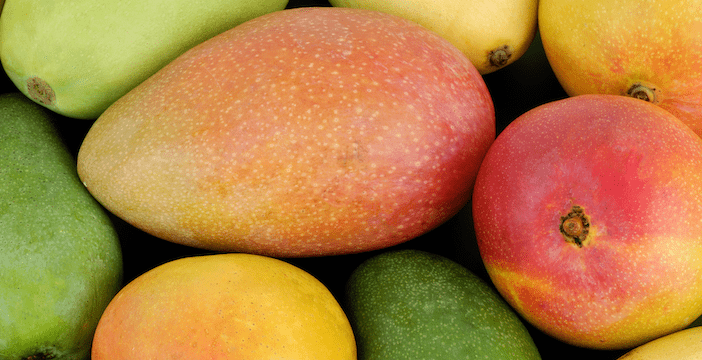
A tropical fruit that’s deliciously sweet, the mango is lauded for its bright yellow flesh and unique flavour, along with a host of health benefits. Some research is also showing that mangoes may help in regulating blood sugar, making them a good fruit choice for people with diabetes too.
Here’s the scoop on one of nature’s best tropical treats, and how it can impact diabetes.
Why are mangoes good for you?
Loaded with vitamins, minerals and fibre, mangoes pack in the nutrients, making them great for boosting the immune system.
Mangoes contain enzymes to help with the breakdown and digestion of proteins so they’re good for the gut too. Mangoes also contain antioxidants, which can delay or prevent damage to the cells, and even help prevent type 2 diabetes. They’re also useful in controlling high cholesterol levels too.
How do mangoes impact blood sugar?
While 90% of the calories in a mango come from natural sugar, this fruit won’t necessarily spike your blood sugar. That’s because mangoes also contain antioxidants and fibre to slow down the rate at which your body absorbs the sugar into your bloodstream.
The mango also has a relatively low glycemic index (GI) a tool used to rank foods according to their effects on blood sugar. Any food with a GI under 55 is considered low.
Glycemic load (GL) takes into account both the glycemic index of a food and the amount of carbohydrate it contains in a typical serving (i.e. how much you eat of that food). It provides a more accurate picture of how a food affects blood sugar levels than the glycemic index alone.
So one mango can contain 31 grams of sugar but its glycemic load is only 10 because its high fibre limits the sugar from rapidly absorbing into the blood. Here are more fruits with a low GI to consider.
Glycemic load and index for mango
Glycemic Index (GI):
- Average: Around 51–56 (low to medium)
- Factors affecting GI: Ripeness (riper mangoes have a higher GI) and variety can influence the exact GI.
Glycemic Load (GL):
- 100 grams: Approximately 8.4 (low)
- 1 cup (165g): Approximately 11 (medium)
- ½ cup serving: Approximately 7 (low)
Are mangoes safe if you have prediabetes or type 2 diabetes?
Yes, in moderation. As a nutrient-filled fruit that has been linked to better blood sugar control, the mango is a good addition to a prediabetes or diabetes diet. However, portion control and pairing mango with the appropriate foods is is key.
If you have diabetes, start with a half cup of mango at first to see how it affects your blood sugar.
It’s also a good idea to pair mango with a protein, such as a handful of nuts or a piece of cheese, which will result in a lower hit on your blood sugar than eating the fruit on its own.
How can I get more mango in my diet?
- Fresh mango is the best option because it contains water and fibre
- Frozen mango is a good alternative, as it usually has no added sugar
- Dried mango should be limited or avoided – it’s highly concentrated in sugar and calories and often sweetened during processing. As little as a small handful of dried mangoes can be equal to the sugar amount of several fresh mangoes.
In addition to eating mango on its own, consider keeping some frozen mango on hand and adding it to your next smoothie. Trying pureeing mango to drizzle on some yogurt, or freeze some fresh mango in ice-cube trays for a cool treat on a hot summer day. Mangoes make a great addition to fruit salads too.
Brighten up your meals with the fresh, tropical taste of mango — explore our delicious recipes that make healthy eating a little sweeter:
Corn, Mango & Halloumi Salad with Arugula
Key takeaways
-
Eating mangoes every day may help improve blood sugar levels for people with prediabetes.
-
Mangoes are rich in fibre, vitamins, minerals, and antioxidants that support good health.
-
Enjoy mangoes with a protein source—like yogurt, nuts, or cheese—to help keep blood sugar steady.
Here’s more info on how to make sure you fill your cart with plenty of fruits and vegetables—including mango—on your next grocery run.
Remember that not all fruits are created equal so choose wisely.


